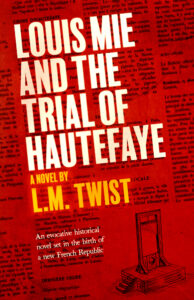Launch: L.M. Twist’s Louis Mie and the Trial of Hautefaye
INTERVIEW BY ELLEN IRWIN
L.M. Twist is a lawyer and debut novelist. She lives in San Diego with her husband, son, and one demanding cat.
How would you describe this award-winning debut novel and its themes in a few sentences?
Louis Mie and the Trial of Hautefaye is about a tragic true crime and murder trial in 1870 France, while the country was in the thick of the Franco-Prussian War, just after the downfall of Emperor Napoleon III and the birth of France’s Third Republic. It’s also about the role of politics in our lives and how political strife and ambition can tear us apart. It’s about connecting as individuals by recognizing compassion and empathy for others. Mostly, it’s about a real-life lawyer, Louis Mie, and how he tries to navigate these waters without losing his principles and his wife.
 What was your inspiration for writing a story about the Hautefaye Affair, set during the Franco-Prussian war?
What was your inspiration for writing a story about the Hautefaye Affair, set during the Franco-Prussian war?
I knew I wanted to set a story in Dordogne, France. Besides the region’s vibrant history and beautiful setting, I had a personal connection, having lived and met my husband there. Bonus points for me if I could make that my research destination! I stumbled upon the Hautefaye Affair while researching and kept returning to it. The story just wouldn’t let go. Then I stumbled on Louis Mie, an ardent advocate for equality and far-left republicanism, who had spent years fighting against what he saw as an imperialist dictatorship under Napoleon III. He agreed to take on the defense of murderers who had killed a man in the name of defending Napoleon, an outgrowth of a certain paranoid, political zealotry and a symptom of the breaking point to which the society had been pushed during a difficult period. I was very intrigued by Louis Mie and what he must have been going through during this period to have made this decision to act as one of the defense lawyers.
Were you able to travel to any of the locations in this novel? If so, how did the experience enhance your story?
Yes! I was very fortunate to work in a trip to Périgueux, where I was able to find Louis Mie’s old house, view the courthouse, and visit Louis Mie’s grave. My father-in-law and I took a road trip to Hautefaye, and it was haunting to see the village. It made the events of that day all the more real and surreal. Most of the pictures at the beginning of each chapter in the book are ones I took during my trip, and I hoped they would show a real connection to many of the locations referenced in the story.
Was there a particular historical figure or fact you came across in your research that made a special appearance in Louis Mie and the Trial of Hautefaye?
I couldn’t set a story in Périgueux without incorporating the governmental schism between Paris and Bordeaux in early 1871. I made sure to have Léon Gambetta make an appearance. He was leading the Bordeaux faction of the Government of National Defense and was Minister of the Interior and of War. He was fiery and controversial in his belief that France should fight Prussia to the last man standing. In contrast, the Paris government had negotiated what he saw as a shameful armistice.
How has your career as a lawyer enriched your ability to tell this story from the POV of your main character, the republican lawyer Louis?
I’m not a defense or trial attorney, but there was a familiarity and logic to some of the trial and procedural aspects. I felt my background perhaps allowed me to make some of my own conjectures as to how he thought about his client and how he handled certain things. For instance, his frustration with Leonard I could understand closely—an intransigent or stubborn client can be very hard to deal with, as is the feeling of trying so hard to help someone who isn’t accepting your advice. Trials also aren’t just a rote presentation of facts and arguments; the lawyer may need to consider the preferences and personalities of judges, the perceptions of jurors, and the wishes of their clients while under the pressure of deadlines and the stakes of the trial outcome itself. The job can take a toll on a lawyer’s mental health, which I believe applies just as much then as now.
The conflict between Louis’ dedication to work and his marriage resonated with me as an individual attempting to balance many things that matter. Was this a dilemma that also speaks to you, and if so, how did it show up in Louis’ character arc?
*Deep sigh*. In a word, yup. The balance is tough to maintain, and I’ve experienced many times when I felt I was not getting it right. I knew from his writings, Louis was passionate about the law and the principles he believed in, but I also knew from other accounts that he was very devoted to his family. I wanted to use this trial as a critical inflection point in his life where he would have to weigh those priorities and risk losing everything.
 What first drew you into writing historical fiction?
What first drew you into writing historical fiction?
History was one of my majors in college, and I never tire of learning about it. I became a lawyer but, over the years, found I was craving a creative outlet. I started doing some writing in 2020, like so many of us during the pandemic, and then found that I loved combining the creative with historical research.
What was the most significant challenge you had to overcome in your journey toward publication of this debut novel, and how did you overcome it?
Fear that I would never finish, self-doubt about it being any good or worthy of anyone’s time. I don’t know if I overcame it, but the best thing was to finish and publish. I just had to tell myself that embarrassment might be the price of entry to do something I loved.
What is the best writing advice you have up your sleeve?
Just keep swimming. Keep picking away at the story, the research, anything. Even if it feels like you’re hardly making any progress and it will never come together in a finished project; you can make it there, inch by inch.
What is the last great book you read?
Wolf Hall by Hilary Mantel.






